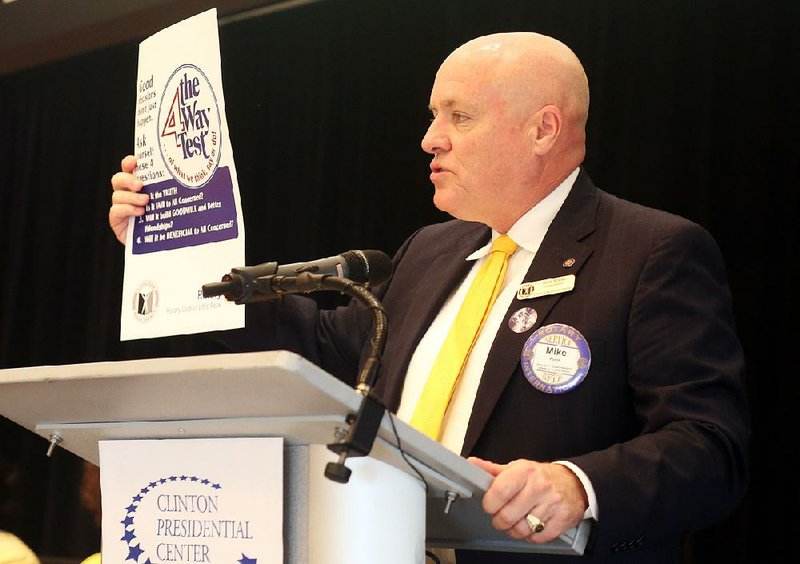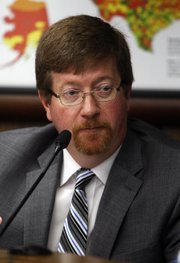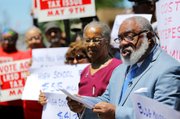After last month's voter defeat of a 12.4-mill school tax extension, the Little Rock School District is taking a different and more scaled-back approach to paying for a new high school and for upgrades at other campuses.
District leaders last week took the first steps necessary to issue $92,055,000 in second-lien bonds for the high school construction and improvements at other schools, including new roofs, new heating and air-conditioning systems, and new security systems.
While the original plan to extend the levy of the 12.4 mills by 14 years to 2047 would have generated $160 million for construction and repairs, the new plan for issuing second-lien bonds does not require voter approval. Second-lien bonds are secured or repaid using existing sources of revenue, and not new or newly extended tax mills.
"It is less money, but it tackles ... an extremely poor facility," Little Rock Superintendent Mike Poore said about the second-lien bonds and the district's 806-student McClellan High, which would be replaced by a new high school.
The new school for 2,250 students in grades nine through 12 would also house students now assigned to J.A. Fair High, which had an enrollment last year of 901. The district is planning a $90 million school for a site between Mabelvale Pike and Mann Road behind the Home Depot and Wal-Mart stores. The district would use a part of the second-lien bond money plus other district funds for the high school, leaving some money for improvements at other district campuses.
A replacement school for McClellan High was among some $350 million in districtwide building needs identified in 2014 by a consulting team of engineers, architects and education planners.
"This list of $350 million -- we've got to tackle it," Poore said. "We have got to do anything that we can in my eyes to move the needle. This doesn't get us as far along, but it still allows us to move forward, and I think it is going to help us compete in terms of having a facility and a campus that will attract and draw students in the southwest corridor."
The plan for the second-lien bond issue comes not only in the wake of the most recent special election but also at a time when the district has decided to close three schools and repurpose a fourth over the objections of some community members. Additionally, district leaders are defendants in a federal lawsuit that in part alleges racially inequitable building conditions in the district. That case goes to trial in July.
Poore last week asked Arkansas Education Commissioner Johnny Key -- who acts in place of an elected school board for the state-controlled district -- for authorization to ask the Arkansas Board of Education for approval to issue second-lien bonds.
Key approved the resolution Friday and emailed an explanation about it to the Arkansas Board of Education. The Board of Education is expected to act on bond-issue applications from school districts at its August meeting.
If the Little Rock district application is approved, the bonds will be offered to investors at some point after that.
"This is a commitment to the families and students of the district that was made by the previous School Board, but was at that time contingent upon a millage increase," Key wrote to the Education Board about a new high school. "Mr. Poore has repeatedly stated his commitment to this project. Due to the favorable conditions surrounding interest rates, coupled with the restriction that the final [$37.3] million desegregation payment be dedicated to facilities, we have a window to make this happen now without a millage increase."
Key also noted that surrounding school districts such as Pulaski County Special, Jacksonville/North Pulaski and Bryant are all in various stages of constructing new schools. North Little Rock has recently completed the construction or extensive remodel of nearly all of its schools.
"Failure to take this action now will put LRSD at a distinct competitive disadvantage in attracting and retaining students," Key told the Education Board. "I am convinced that approving the second-lien bonds is the best course of action and will contribute to the long-term stability of the district and the success of its students."
Former Pulaski County Circuit Judge Marion Humphrey was one of the leaders of the No Taxation Without Representation campaign against the 12.4-mill tax extension proposal earlier this year.
He said last week that he is not opposed to the construction of a new high school. He would prefer that the district pay for construction with its savings on a pay-as-you-go-basis without incurring new debt. But he also said he is not stridently opposed to the possibility of using second-lien bonds if that is the only viable option. He said he wished he had before him information on all the possible funding alternatives.
"These things are not brought forth in a public arena so that we can all hear the options," Humphrey said, adding such presentations and public discussions would be forthcoming if the district had an elected local school board.
Humphrey called on Gov. Asa Hutchinson to intervene to restore the Little Rock district's displaced school board members to their elected seats.
The Board of Education voted in January 2015 to take over the district -- the state's largest -- by dissolving the School Board and putting the superintendent under the supervision of the commissioner. That was done because six of the district's 48 schools were labeled by the state as academically distressed for chronically low student test scores. The number of distressed schools has since been reduced to three.
In conjunction with asking Key for the bond-issue resolution, Little Rock district leaders took steps last week to place a notice in the Arkansas Democrat-Gazette of its intent to issue bonds, a notice that is required by law.
The district, which is being advised by Stephens Inc. and the Friday, Eldredge & Clark law firm, anticipates paying an interest rate of 2.89 percent on a bond issue of $92,055,000.
The plan calls for the district to repay the bond debt over 16 years with money generated by the already levied 12.4 debt-service property tax mills.
The existing 12.4 mills generate about $43.1 million a year, of which $13.5 million is earmarked for already existing bond-debt payments. The yearly surplus of almost $30 million is used to meet other district operating costs, including maintenance, equipment, salaries and utilities.
Poore said last week that the district is in a "pretty good financial situation" to make new debt payments. That is fueled by the growing property values and district reserves, he said. The district's unrestricted reserves, or savings, now total almost $64 million.
"We are definitely not putting the district in any financial or fiscal distress. We can make the payment and not have to make further reductions [in operating costs] just to make the payments."
But Poore also didn't rule out possible budget cuts down the line, depending upon circumstances.
"It may be that we want to get another second-lien loan," he said. "If we want to get another second-lien loan, we may have to tighten our belts a little bit more. If we lose a large number of students again, we are going to have to tighten our belts again. Reductions are always possible based on your economics, but we have the resources right now to make this payment, and I don't foresee any drastic thing that would cause us a problem in making the payment."
The original plan to extend the 12.4 mills from 2033 to 2047 would not have increased annual tax bills but would have required property owners to pay the same annual rate for more years. Poore, with the approval of Key, had proposed issuing about $202 million in general-obligation bonds to pay off existing debt at a lower interest rate and generate $160 million to go toward the construction of a southwest Little Rock high school and for improvements at all other campuses.
The tax proposal divided some of the city's most prominent business, education and government leaders into different camps and even pulled in Hutchinson, who spoke in support for passage of the measure.
Metro on 06/25/2017


